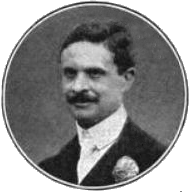Waldorf Astor
|
The Right Honourable The Viscount Astor DL |
|
|---|---|
 |
|
| Member of Parliament for Plymouth | |
|
In office 19 December 1910 – 25 November 1918 |
|
| Preceded by |
Charles Edward Mallet and Aneurin Williams |
| Succeeded by | Constituency Abolished |
| Member of Parliament for Plymouth Sutton | |
|
In office 14 December 1918 – 18 October 1919 |
|
| Preceded by | Constituency Created |
| Succeeded by | Nancy Astor |
| Personal details | |
| Born |
19 May 1879 New York City, U.S. |
| Died | 30 September 1952 (aged 73) Taplow, Buckinghamshire, England |
| Spouse(s) |
Nancy Witcher Langhorne (m. 1906–1952; his death) |
| Relations |
|
| Children |
|
| Parents |
William Waldorf Astor Mary Dahlgren Paul |
| Alma mater |
Eton College New College, Oxford |
Waldorf Astor, 2nd Viscount Astor DL (19 May 1879 – 30 September 1952) was an American-born English politician and newspaper proprietor. He was also a member of the Astor family.
Waldorf Astor was born in New York City. He was the eldest son of William Waldorf Astor, 1st Viscount Astor and Mary Dahlgren Paul (1858–1894); his younger brothers were John Rudolph Astor (who died young) and Baron John Jacob Astor V. He spent much of his life traveling and living in Europe before his family settled in Great Britain in 1889. There Waldorf attended Eton College and New College, Oxford, where he did not distinguish himself academically but excelled as a sportsman, earning accolades for both fencing and polo. For the Oxford University Polo Club he played side on side with Devereux Milburn in successive Varsity Matches, winning by a margin of 14 goals on both occasions.
In 1905, while a passenger on an Atlantic voyage returning to Britain, Astor met Nancy Langhorne Shaw, a divorced woman with a young son (Robert Gould Shaw III). Coincidentally, both he and Mrs. Shaw shared the same birthdate, May 19, 1879, and both were American. After a rapid courtship, the two married in May 1906. As a wedding gift, Waldorf's father gave him and his bride the family estate at Cliveden, which Nancy redecorated and modernized with the installation of electricity. Theirs proved a close marriage, and they had five children:
Astor valued his wife; through her, Astor developed an interest in social reform.
Nancy also encouraged her husband to launch a career in politics. Though defeated in an initial attempt to win election to the House of Commons in the January 1910 general election, Astor won election as a Unionist for the borough of Plymouth in the December 1910 general election. He held the seat until the constituency was abolished in 1918, after which he moved to the borough of Plymouth Sutton. Despite his political affiliation, Astor quickly demonstrated his independence by his support for the so-called "People's Budget" and the National Insurance Act of 1911.
...
Wikipedia
